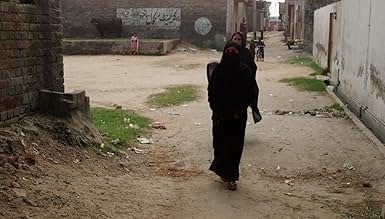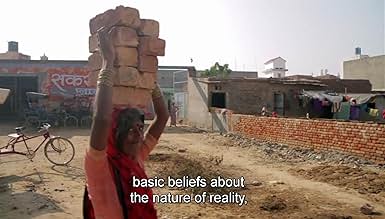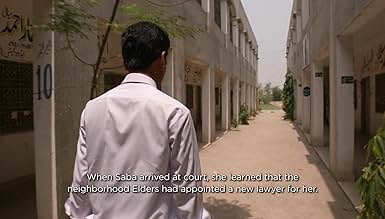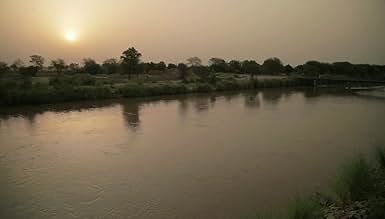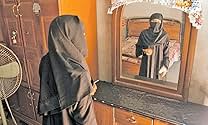A woman in Pakistan sentenced to death for falling in love becomes a rare survivor of the country's harsh judicial system.A woman in Pakistan sentenced to death for falling in love becomes a rare survivor of the country's harsh judicial system.A woman in Pakistan sentenced to death for falling in love becomes a rare survivor of the country's harsh judicial system.
- Director
- Stars
- Won 1 Oscar
- 3 wins & 2 nominations total
Featured reviews
A GIRL IN THE RIVER
THE PRICE OF FORGIVENESS
Sharmeen Obaid-Chinoy born in November 12, 1978) is a Canadian-Pakistani journalist, filmmaker and polbornitical activist known for her work in films that highlight gender inequality against women. Sharmeen Obaid-Chinoy won the Oscar for Short Documentary in 2012 for Saving Face. She's nominated again this year for A Girl in the River: The Price of Forgiveness. Both films tell the stories of Pakistani women mutilated or killed by radical moralists, and highlight the people around them fighting for societal progress.
It's a cliché to say that cinema has the power to change the world, but the reason it's become such a well-worn phrase is because films like Sharmeen Obaid-Chinoy's A Girl in the River: The Price of Forgiveness exist to make it happen and influence lawmakers at the highest level.
The filmmaker won her second Academy Award in the 'Best Documentary Short' category for the 40 Minute profile piece that premiered on HBO, and it ended up instigating similar change to her first winner, Saving Face, a haunting story centred on acid attacks made against women in Pakistan.
A Girl in the River follows Saba, a Year-old who survives an honour killing attempt made by her father and uncle after she defied their express wishes to elope with her husband. She was shot in the head, placed in a sack, and then dumped in the river, but miraculously managed to escape her near-fatal predicament and make her way to a local hospital, beginning a fight for justice that faced an uphill struggle to alter the traditional way of thinking in local society.
As Obaid-Chinoy explained to the International Documentary Association, her second Oscar-winning documentary reached all the way to the corridors of power, with the Pakistani prime minister vowing to make changes to the nation's existing legislation as it pertained to honour killings, driven largely by the impact of A Girl in the River.
Review written by artist jayakumar jrain.
Sharmeen Obaid-Chinoy born in November 12, 1978) is a Canadian-Pakistani journalist, filmmaker and polbornitical activist known for her work in films that highlight gender inequality against women. Sharmeen Obaid-Chinoy won the Oscar for Short Documentary in 2012 for Saving Face. She's nominated again this year for A Girl in the River: The Price of Forgiveness. Both films tell the stories of Pakistani women mutilated or killed by radical moralists, and highlight the people around them fighting for societal progress.
It's a cliché to say that cinema has the power to change the world, but the reason it's become such a well-worn phrase is because films like Sharmeen Obaid-Chinoy's A Girl in the River: The Price of Forgiveness exist to make it happen and influence lawmakers at the highest level.
The filmmaker won her second Academy Award in the 'Best Documentary Short' category for the 40 Minute profile piece that premiered on HBO, and it ended up instigating similar change to her first winner, Saving Face, a haunting story centred on acid attacks made against women in Pakistan.
A Girl in the River follows Saba, a Year-old who survives an honour killing attempt made by her father and uncle after she defied their express wishes to elope with her husband. She was shot in the head, placed in a sack, and then dumped in the river, but miraculously managed to escape her near-fatal predicament and make her way to a local hospital, beginning a fight for justice that faced an uphill struggle to alter the traditional way of thinking in local society.
As Obaid-Chinoy explained to the International Documentary Association, her second Oscar-winning documentary reached all the way to the corridors of power, with the Pakistani prime minister vowing to make changes to the nation's existing legislation as it pertained to honour killings, driven largely by the impact of A Girl in the River.
Review written by artist jayakumar jrain.
If you like true stories told very well, but briefly, and you'd like to get a leg up in an Oscar pool, then this review is for you! In my continuing effort to see as many Oscar nominees as possible, I took advantage of the opportunity to see the shorts.TV theatrical presentation "Oscar Nominated Short Films 2016: Documentary" (NR, 3:00 – with 10 min. intermission). Here's a brief, spoiler-free summary and evaluation of one of those five films...
"A Girl in the River: The Price of Forgiveness" (40 min.) – Saba was an 18-year-old Pakistani girl who fell in love with and married a young man of whom her family did not approve. For this "crime", her father and uncle kidnapped her from the home of her new husband's family, drove her to a riverbank, shot her in the head, placed her in a sack and threw her in the river. Saba was one of over 1,000 women targeted for "honor killings" every year in Pakistan, but unlike most of those nameless victims, Saba survived. We see her in the hospital being treated for her wounds, then we follow her as she returns to live with her husband and his family and is pressured to drop the charges against her uncle and father and publicly "forgive" them. All the key players in this real-life drama give interviews in which they tell us about their roles in this story and openly discuss their points of view. We even get to sit in on a meeting between local tribal elders and Saba's lawyer, trying to find a resolution to the case. With remarkable access, a flare for story-telling and the ability to present all points of view without judgment, Sharmeen Obaid-Chinoy has directed an important and outstanding film which rises above the label of "documentary short" and demands to be seen by everyone who cares about our common humanity. "A+"
The other four films in the shorts.TV theatrical presentation "Oscar Nominated Short Films 2016: Documentary" are "Body Team 12" "Chau, beyond the Lines" "Claude Lanzmann: Spectres of the Shoah" "Last Day of Freedom"
"A Girl in the River: The Price of Forgiveness" (40 min.) – Saba was an 18-year-old Pakistani girl who fell in love with and married a young man of whom her family did not approve. For this "crime", her father and uncle kidnapped her from the home of her new husband's family, drove her to a riverbank, shot her in the head, placed her in a sack and threw her in the river. Saba was one of over 1,000 women targeted for "honor killings" every year in Pakistan, but unlike most of those nameless victims, Saba survived. We see her in the hospital being treated for her wounds, then we follow her as she returns to live with her husband and his family and is pressured to drop the charges against her uncle and father and publicly "forgive" them. All the key players in this real-life drama give interviews in which they tell us about their roles in this story and openly discuss their points of view. We even get to sit in on a meeting between local tribal elders and Saba's lawyer, trying to find a resolution to the case. With remarkable access, a flare for story-telling and the ability to present all points of view without judgment, Sharmeen Obaid-Chinoy has directed an important and outstanding film which rises above the label of "documentary short" and demands to be seen by everyone who cares about our common humanity. "A+"
The other four films in the shorts.TV theatrical presentation "Oscar Nominated Short Films 2016: Documentary" are "Body Team 12" "Chau, beyond the Lines" "Claude Lanzmann: Spectres of the Shoah" "Last Day of Freedom"
This movie documents the outcome for one young lady within the judicial system after an honor killing. Coming out of this, I had to keep in mind that this is one story coming out Pakistan and having never visited Pakistan, I'm unsure of how indicative it is of the country's whole society. What happened to Saba was horrendous and the movie portrays honor killings as common and are only increasing based on current laws. While the laws give more weight to men and treats women as second class citizens, the movie does give hope that there's people who're trying to change the laws. One thing that I think this movie does well is that it interviews both Saba, the family she married into, as well as Saba's immediate family. The interviewers were also able to talk to the police and Saba's original lawyer, prior to the elders giving her a new one and were able to talk with the elders of the community. With that said, I think that the movie was too short to give a full picture of all of the judicial proceedings and the discussions happing.
A country that is so strict with religion has such a loose and imperfect legal system. Such a comparison is to make people understand that the system, religion, is nothing more than a pretext for maintaining their reasonable and unequal treatment of others.
We follow a lovely, and at the same time incredible tough, 18 year old girl (Saba) who survives a murder attempt carried out by her father and uncle.
Her crime is to have fallen in love with the boy that her family wanted as her husband. A new decision about marriage is taken but Saba follows her heart instead of her fathers rules and runs off and gets married.
This act of independence is so hideous and dangerous that the only thing that can restore the family's honor is to kill her. She survives and through interviews with her, the police, a lawyer and family we start to get a picture of how women are looked at in a society that are governed by feudal laws.
Especially the interview with her father and uncle in prison makes us understand that daughters should be considered being in eternal debt to their father who has worked so hard to sustain their lives. If she gets "meal three times a day" then she shouldn't ask for more.
Womens rights are so neglected that if an honor killing is committed and the killer afterward are forgiven by his nearest family - then he walks free. So if Saba forgives her father then he will walk free and so the suspense starts. Will she do this or not? I will not spoil the last part of the story for you but just recommend the movie for being more than politic correct.
When you see Saba together with her newly wedded husband you simply cannot understand that this marriage is looked upon as a crime.
The happy end is that the movie has gotten so much attention that a fund raising has gotten the couple enough money to buy their own land.
/Simon
Ps. When you read reviews that gives max score check to see if the user has made more than one review. If not consider the possibility of a lobbyist. If you agree consider putting this post scriptum at the bottom at your own reviews.
Her crime is to have fallen in love with the boy that her family wanted as her husband. A new decision about marriage is taken but Saba follows her heart instead of her fathers rules and runs off and gets married.
This act of independence is so hideous and dangerous that the only thing that can restore the family's honor is to kill her. She survives and through interviews with her, the police, a lawyer and family we start to get a picture of how women are looked at in a society that are governed by feudal laws.
Especially the interview with her father and uncle in prison makes us understand that daughters should be considered being in eternal debt to their father who has worked so hard to sustain their lives. If she gets "meal three times a day" then she shouldn't ask for more.
Womens rights are so neglected that if an honor killing is committed and the killer afterward are forgiven by his nearest family - then he walks free. So if Saba forgives her father then he will walk free and so the suspense starts. Will she do this or not? I will not spoil the last part of the story for you but just recommend the movie for being more than politic correct.
When you see Saba together with her newly wedded husband you simply cannot understand that this marriage is looked upon as a crime.
The happy end is that the movie has gotten so much attention that a fund raising has gotten the couple enough money to buy their own land.
/Simon
Ps. When you read reviews that gives max score check to see if the user has made more than one review. If not consider the possibility of a lobbyist. If you agree consider putting this post scriptum at the bottom at your own reviews.
Did you know
- TriviaAt the end of her acceptance speech, during the exit music, director Sharmeen Obaid-Chinoy announced that after viewing this film, the Prime Minister of Pakistan will change the law on honor killing.
- ConnectionsFeatured in The Oscar Nominated Short Films 2016: Documentary (2016)
Details
- Release date
- Countries of origin
- Language
- Also known as
- En kvinna i floden: Priset som du får betala för att förlåta
- Production companies
- See more company credits at IMDbPro
- Runtime
- 40m
- Color
Contribute to this page
Suggest an edit or add missing content


